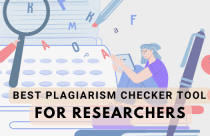Top 12 Must Have Online Tools for Researchers at All Stages

Research is undoubtedly one of the most painstaking and thorough processes. Irrespective of your discipline, stage of work and career, research can be an arduous and time-consuming task. Right from browsing the library shelves and internet for literature, performing experiments, writing papers, to publishing papers, researchers are always running with the clock’s hands. No matter what your field of research, there’s an online tool out there to help you organize your notes, cite your sources, find important articles, connect with colleagues, and much more. However, with so many options available at a mouse click, it gets difficult to find a tool that delivers best results. As the search for reliable resources can be frustrating at times; we will discuss the features of 12 most recommended online tools for researchers at all stages in academia.
What is the Need of Online Tools for Researchers?
Regardless of his/her research area, every researcher’s focus today is on managing various tasks, delivering productive results, utilizing time efficiently, and documenting research that is publication worthy. All these require a well-planned and organized system, which is achieved by monitoring the progress and collaboration of your projects, finding pertinent literature, writing your project proposals, reports, and articles, avoiding language errors, citing original sources, building networks, searching for journals for publication, etc. How do you plan on handling all this by yourself?—The first resort is surfing the internet to find a solution. Several online tools for researchers make this an easier task. However, with uncountable information available online, it can become a time-consuming nightmare to evaluate what works and what doesn’t.
Most Important Online Tools for Researchers
The 6 types of online tools for researchers that are essential at various stages of research are as follows:
A. Project Management Tools
Project management is a set of proven techniques for proposing, planning, implementing, managing, and evaluating projects, combined with the art of managing people. These tools are used to manage project progress, resource application, and collaboration processes. It involves creating a hierarchical task list, following up for task completion, setting deadlines, formulating plan of action, and assigning resources.
Two of the most used project management tools in academia are Trello and GanttPro.
1. Trello
Trello allows users to organize their ideas through the use of panels, cards, and lists. It’s an easy to access system with a simple drag and drop cards function. It allows users to list and schedule activities, establish completion times, and view progress percentages. The user can create multiple boards for different subjects. Additionally, Trello saves the boards in cloud as well as in user’s profile. It offers free and paid versions, depending on the user’s requirements.
2. GanttPRO
GanttPRO is an online Gantt chart program for project management that allows intuitive creation of schedules. It is a paid software which also offers free trial version. GanttPRO allows sub-division of major tasks into minor tasks and offers cost calculation per task. While using a Gantt chart, you can immediately see all the information you need on your chart, including your team’s tasks, their sequences, deadlines, and priorities. GanttPRO is hosted in the cloud, which makes is easily accessible for every team member using any web browser.
B. Grammar Checker Tools
Grammar checker tools are used to detect grammatical, spelling, punctuation, sentence formation errors, etc. Its purpose is to enhance the language of a paper in question. Given the need of the hour, the internet pool is overflowing with several grammar checker tools that suggest fixes and explain the nature of the suggested fixes. For knowledge to be disseminated unambiguously, it is essential that the literature is written correctly. Especially for non-native researchers, the use of grammar checker tools is a must.
Two most recommended grammar checker tools for researchers are Trinka AI and Grammarly.
1. Trinka AI
Trinka AI is the world’s first grammar and language improvement tool designed specifically for academic and technical writing. It is unique as it not only checks grammar, punctuation, and spelling, but also provides explanations for correcting errors. It offers free version that includes access to all its features. The paid version offers uninterrupted usage and higher monthly limits along with access to the add-in for MS Word. It allows you to choose between the US and the UK style to make it easily accessible for researchers all over the world.
Its custom-built features such as maintaining academic tone, providing unbiased language, concept clarity, sentence structure, and alternative word choice makes it better than most grammar checker tools. It also offers subject-specific corrections, select style guides preferences, and 20+ publication readiness checks. It provides detailed explanations as to why a correction is suggested. Furthermore, it helps researchers in reducing word count by suggesting alternatives without changing the context.
2. Grammarly
Grammarly is a popular browser application or extension developed to check grammar, punctuation, context, sentence structure, and readability. It is a real-time plagiarism detector on various platforms, including MS Word, WordPress, Facebook, etc. It is available in free and paid version. The free version offers basic spelling and grammar checks, as well as some suggestions. While the paid version offers the basic revisions and vocabulary improvement suggestions; additionally, it provides citation suggestions and can detect plagiarism.
C. Reference Management Tools
Reference management tools help in managing the literature used for research development, thus offering an alternative to a time-consuming task for researchers. These tools allow you to organize articles and their citations, share them with other researchers, detect duplicate entries, format the list of references, search and replace any reference, etc. Furthermore, it allows researchers to correctly link and cite the works referenced in their articles.
Among many reference management tools available online, Mendeley and EndNote are two of the most widely used.
1. Mendeley
Mendeley is a freely available reference management tool to streamline your referral management workflow. It allows you to store, organize, and search all your references in just one library and generate citations. It includes citation options using various writing style guides needed as per your target journal. The program is compatible with Word (including Mac), LibreOffice, and OpenOffice. It can also be used with LaTex exporting BibTex. Furthermore, its version is also available for Android. Its feature of highlighting and annotating PDFs helps in better organization of multiple documents in one place.
2. EndNote
EndNote is a paid reference management application, which allows researchers to insert citations into the text while simultaneously creating a bibliography with the “Cite While You Write” feature in MS Word. Additionally, it aligns and formats the article as per the requirements of the journal of interest using “Manuscript Matcher”. Furthermore, it organizes references automatically and enables sharing of work amongst remote computers.
D. Plagiarism Checkers
The academic world is riddled with plagiarism and perhaps due to the dizzying pace of publications, researchers can unknowingly fall prey to the derisive act of plagiarism. To avoid getting your manuscript rejected and consequently affecting your image as a researcher, it is wise to run your manuscript through a plagiarism checker tool. These tools can not only help you in checking plagiarized content, but also help in identifying potential collaborations with researchers that belong to the same field.
To detect plagiarism, researchers can opt for plagiarism checker tools such as Enago’s Plagiarism Checker and Duplichecker.
1. Enago’s Plagiarism Checker
Enago’s plagiarism checker is a unique tool for quick, comprehensive, and dependable plagiarism checking, especially for research. It helps you assess the originality of a manuscript using advanced plagiarism software and provides a report highlighting areas in your text if the program recognizes existing material in it. It is easy to access with one click upload button. Furthermore, it includes an AI-based grammar check feature that checks your document for grammar errors typical to academic writing, and provides a tracked changes file that you can download and review.
In addition, its power editing mode enhances your document by correcting sentence structure, word choice, and subject-specific phrasing. Its extensive scholarly database of over 91+ billion web pages and 82+ million published articles ensures thorough plagiarism check as compared to other checkers. The tool is cost-effective with most reliable results. More importantly, a detailed interactive color-coded and plagiarism percentage report can be reviewed online and also be downloaded in PDF format if needed.
2. Duplichecker
Duplichecker offers a free version for texts of up to 1000 words and is available in paid versions for word count above 1000. It provides plagiarism percentage and highlights similar content to the list of sources. However, it does not provide detailed report. It has a limited database access as it compares your document only to Internet sources and online books. Lastly, the plagiarism report is easy to read and is downloadable in PDF and MS Word format.
E. Journal Finder
One of the common rejection factors of research journals is that the subject of the research is not within those contemplated by the journal. The journal search engines help researchers to choose the best suitable journal for publishing their research. These tools are very useful to avoid getting involved in a manuscript submission process that would be wrong from the beginning.
The two effective and reliable journal finder tools are Enago Open Access Journal Finder (Enago OAJF) and Elsevier Journal Finder (Elsevier JF).
1. Enago’s Open Access Journal Finder
Enago’s OAJF is a freely available tool that protects you from falling prey to predatory publishers. It solves issues such as journal legitimacy and reports article processing fees through a journal index validated and issued by the Directory of Open Access Journals (DOAJ). It allows you to find pre-screened and quality journals in the public domain. Enago’s exclusive search algorithm allows you to compile a concise list of journals related to your research work.
2. Elsevier Journal Finder
Elsevier Journal Finder allows you to enter the title and abstract of your article to easily find journals that are most likely suitable for your publication. It uses intelligent search technology and vocabularies specific to the corresponding research field to match your article to scientific journals.
F. Social Networking for Academics
Research advances when shared; hence, the connection and exchange of ideas between researchers is essential. To socialize, work networks are a great help that encourages collaborative effort at a distance. This makes it possible to publicize the profile of a researcher to the scientific community, as well as promote their research and establish links with other work teams across the globe.
Two most commonly used academic networks include Academia.edu and ResearchGate.
1. Academia.edu
Academia.edu is a freely accessible platform for sharing research documents and connecting with academics across the globe. As of now, over 22 million articles and about 31 million academics, professionals, researchers are active on the platform. Academia.edu’s algorithms generate about 20 million article recommendations per day. It is also possible to exchange knowledge in effective formats of video, short content, dataset, etc. You can receive notifications when you are cited and referenced, acknowledged as a co-author, and expressed gratitude for your co-operation.
2. ResearchGate
ResearchGate is also a freely available networking platform to connect scientists and make research available to everyone. Currently, there are over 20 million researchers from more than 190 countries connecting through ResearchGate to collaborate and share their work. It also allows interactive conversations with researchers on the platform.
Do you use any of the above mentioned online tools? Do you think that these online tools for researchers can significantly ease your effort? Which are some other tools you know of that you find useful for academic work? Let us know in the comments section below! You can also visit our Q&A forum for frequently asked questions related to different aspects of research writing and publishing answered by our team that comprises subject-matter experts, eminent researchers, and publication experts.









